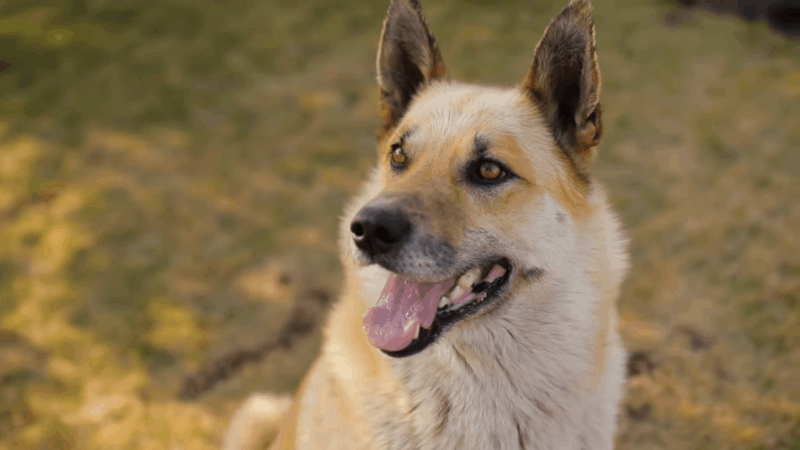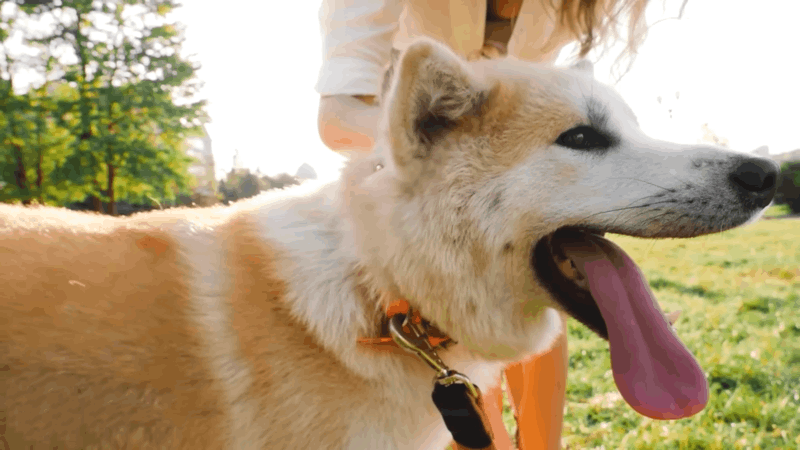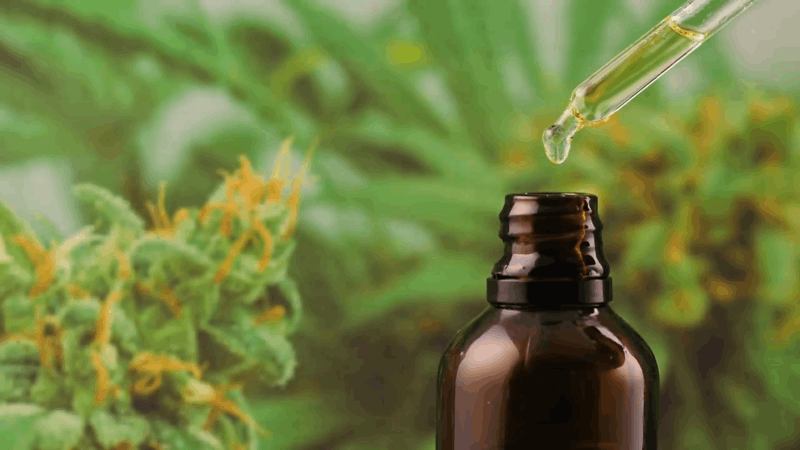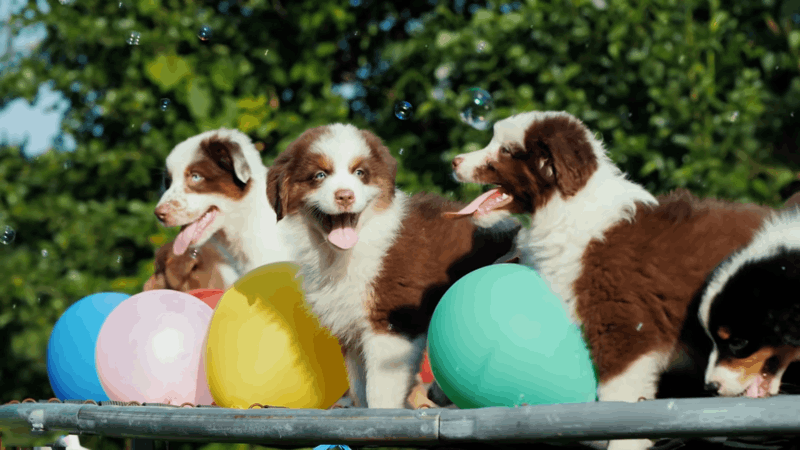No products in the cart.
As a potential solution for managing anxiety and stress-related behaviors, CBD for reactive dogs is garnering attention. Many pet owners are turning to CBD products to help their reactive dogs feel calmer and more at ease in triggering situations. As a non-psychoactive substance, CBD presents a secure substitute for conventional drugs with fewer known negative effects.
This blog discusses the possible advantages of CBD for reactive dogs, how it functions, and crucial factors for pet owners thinking about experimenting with CBD oil dog to enhance the well-being of their four-legged buddies.
What are Reactive Dogs?

Reactive dogs are canines that display heightened or intense reactions to certain stimuli in their environment. When faced with such stimuli, reactive dogs may exhibit behaviors like barking, lunging, growling, or pulling on the leash. These responses are frequently motivated by fear, worry, or a desire to put ourselves apart from potential hazards.
Reactive Dog Symptoms
Reactive dog symptoms are observable behaviors and physical reactions displayed by a dog when confronted with certain triggers or stimuli. These symptoms can vary in intensity and may include:
- Barking and growling: Reactive dogs often vocalize loudly when they encounter something that triggers their anxiety or fear. This vocalization serves as a warning to potential threats or to establish distance from the perceived danger.
- Lunging and pulling on the leash: When faced with a trigger, reactive dogs may attempt to approach or move away rapidly, leading to excessive pulling or lunging on the leash.
- Raised hackles: The fur along the dog’s back may stand up and become bristled when the dog feels threatened or agitated.
- Dilated pupils: Reactive dogs may have enlarged pupils, a sign of heightened arousal or stress.
- Tense body language: Dogs might exhibit stiff body posture, showing signs of stress and readiness for action.
- Excessive salivation: Nervous or anxious reactions can cause dogs to drool more than usual.
- Avoidance or hiding: In some cases, reactive dogs may try to escape from the situation altogether by seeking hiding spots or avoiding the trigger.
- Aggressive behavior: In severe cases, reactive dogs may resort to aggressive actions as a defensive response to their perceived threats.
It’s crucial to remember that these signs can appear in a variety of settings and are not just present in reactive dogs. If you suspect your dog is reactive, it is essential to consult a professional dog trainer or behaviorist for proper evaluation and guidance in managing and modifying their reactive behaviors.
What Causes Reactivity in Dogs?
While the exact cause of reactivity can vary from one dog to another, some common factors that contribute to reactive behavior include
- Lack of socialization: Dogs that have not been properly exposed to various stimuli, people, and other dogs during their critical socialization period (usually between 3 and 16 weeks of age) may become fearful or anxious when encountering new situations later in life.
- Negative experiences: Traumatic or negative experiences, such as being attacked by another dog, loud noises, or harsh punishment, can lead to fear-based reactivity as a defensive response.
- Genetics: Some breeds or individual dogs may have a predisposition to react more strongly to certain stimuli due to genetic factors.
- Fear and anxiety: Dogs with a naturally anxious or fearful temperament may be more prone to reactive behaviors as they perceive potential threats in their environment.
- Lack of training: Dogs that haven’t received proper obedience training may struggle to cope with their emotions and impulses, leading to reactive responses.
- Leash frustration: Being restrained on a leash can contribute to reactivity as dogs may feel trapped and unable to escape perceived threats, leading to increased frustration.
- Resource guarding: Some dogs become reactive when they feel their resources (food, toys, or attention) are at risk of being taken away or approached by other dogs or people.
- Medical issues: Pain or underlying medical conditions can also contribute to reactive behavior, as the dog may become more sensitive and irritable.
It’s critical to realize that reactivity is a taught response to particular situations rather than an innate personality attribute. If you have a reactive dog, seeking the help of a professional dog trainer or behaviorist is essential to address and manage their reactive behavior effectively.
How to Train Reactive Dogs?

Training reactive dogs requires special care and attention to help them overcome their fear and anxiety. Here are some tips and tricks to assist in training reactive dogs
- Stay calm: As the owner, it’s crucial to remain calm and composed during training sessions. Dogs can sense their human’s emotions, and your calm demeanor can help the dog feel more secure.
- Positive reinforcement: Use strategies for positive reinforcement, such as toys, praise, and food, to encourage restrained and non-reactive behavior. This encourages the dog to associate positive outcomes with the presence of triggers.
- Watch body language: Learn to read your dog’s body language to anticipate reactive behaviors. You may take action before things get out of hand by being aware of the early indications of stress in canines.
- Focus on basic obedience: Prioritize basic obedience commands like “sit,” “stay,” and “leave it.” These commands can redirect your dog’s attention away from triggers and maintain control in challenging situations.
- Use desensitization: Gradually expose the dogs to their triggers in a controlled manner, increasing their tolerance over time. This process should be slow and always within the dog’s comfort zone.
- Set realistic goals: Progress may be slow, and setbacks are common. Celebrate small victories and be patient with your dog’s individual pace of improvement.
- Avoid punishment: Never use punishment or forceful methods in training reactive dogs. This can exacerbate fear and lead to more significant behavioral issues.
- Consistency is key: Be consistent with training routines and techniques. Regular practice and repetition help reinforce positive behaviors.
- Seek professional help: Enlist the support of a professional dog trainer or behaviorist experienced in working with reactive dogs. They can provide personalized guidance and create a structured training plan.
Keep in mind that each dog is different, so what works for one dog might not work for another. Tailor your approach to suit your dog’s personality and specific triggers. With patience, understanding, and positive reinforcement, many reactive dogs can make significant progress and enjoy a happier, less anxious life.
Medication for Reactive Dogs

Medication can be a valuable component of a comprehensive treatment plan for reactive dogs, especially when combined with behavior modification and training. Always consult a veterinarian or veterinary behaviorist before deciding to administer medicine. It’s critical to remember that medicine should be utilized as a component of a comprehensive strategy that also incorporates environmental management and instruction in behavior change.
Medication can help take the edge off anxiety and facilitate the learning process, making it more effective. However, it is not a standalone solution and should always be combined with proper training and behavior modification techniques.
Consideration Before Giving Medication for Reactive Dogs
Here are some important points to consider regarding medication for reactive dogs:
- Supplementing behavior modification: Medication should not be considered a standalone solution but rather a tool to aid in behavior modification. It can aid in lowering a dog’s reactivity and anxiety, making it more open to training.
- Addressing underlying anxiety: Reactive behavior in dogs is often linked to fear and anxiety. Medication can help alleviate these underlying emotional issues, enabling the dog to respond better to training and environmental changes.
- Individualized approach: Because each dog is different, the medication chosen for them should be based on their individual requirements and state of health.
- Proper dosage and monitoring: Dosage and medication adjustments should be determined by a veterinarian. Regular monitoring is essential to assess the dog’s response and make necessary modifications.
- Side effects: The use of behavior-modifying medications may have potential negative effects, just like any other treatment. A veterinarian can explain the risks and benefits and discuss potential side effects to watch for.
- Temporary vs. long-term use: In some cases, medication may only be needed temporarily to help manage a dog’s reactivity during specific training periods. In other cases, chronic medication may be required to keep a balanced condition.
- Combined approach: Medication works best when used in conjunction with positive reinforcement training, behavior modification techniques, and environmental management. A holistic approach offers the best chance of success.
To support a reactive dog’s journey towards improved behavior and well-being, medication should be used as a complementing tool, not as a replacement for training.
Side Effects of Medication for Reactive Dogs
Medication for reactive dogs can be helpful in reducing anxiety and improving behavior, but like any medication, it may come with potential side effects. Some common side effects of medications used for reactive dogs include
- Sedation: Some medications can cause drowsiness or sedation, which might affect the dog’s energy levels and alertness.
- Gastrointestinal upset: Dogs may experience digestive issues like vomiting or diarrhea, as a side effect of certain medications.
- Increased thirst and urination: Some medications may lead to increased water intake and more frequent urination.
- Changes in appetite: Dogs may experience a decreased or increased appetite while on medication.
- Agitation or restlessness: In some cases, dogs may show signs of agitation or restlessness as a side effect.
- Allergic reactions: Medication allergies are possible and might emerge as skin rashes, hives, or difficulty breathing.
- Behavioral changes: Medication can occasionally produce behavioral changes like increased hostility or excessive hyperactivity.
- Interactions with other medications: Medications used for reactive dogs may interact with other drugs the dog is taking, leading to potential complications.
- Liver or kidney issues: Some medications can affect liver or kidney function in dogs, requiring careful monitoring, especially in long-term use.
It’s important to work closely with a veterinarian when starting any medication for a reactive dog. Regular check-ups and open communication with the veterinarian will help ensure the best care and management for a reactive dog.
CBD for Reactive Dogs: the Potential Benefits

CBD (cannabidiol) has gained attention as a potential aid for reactive dogs. CBD may aid in promoting a sensation of calm and relaxation and the reduction of anxiety and tension. By easing these emotional responses, CBD can support behavior modification training, helping reactive dogs cope better with triggers.
CBD is a non-psychoactive chemical that has fewer documented negative effects than certain standard drugs. However, while CBD shows promise, it should be used as part of a comprehensive approach to managing reactivity, with guidance from a veterinarian familiar with CBD use in pets. Always use high-quality, pet-specific CBD products to ensure safety and effectiveness.
Does CBD Help Reactive Dogs
CBD (cannabidiol) has shown promise in helping some reactive dogs by reducing anxiety and stress levels. The potential benefits of CBD for reactive dogs include
- Anxiety reduction: CBD may help reduce anxiety and fear responses in dogs, which can be particularly helpful for reactive dogs that tend to display heightened reactivity when faced with triggers.
- Calming effect: CBD’s calming properties can help reactive dogs feel more relaxed and at ease in triggering situations, making it easier for them to cope with their environment.
- Support for behavior modification: By reducing anxiety, CBD can complement behavior modification training for reactive dogs, making the training process more effective.
- Non-psychoactive: Pet owners can ensure safety when using CBD because it is non-psychoactive, meaning CBD doesn’t provide the same “high” as THC.
- Fewer side effects: Compared to other conventional drugs, CBD has generally been reported to have fewer adverse effects, however, individual reactions may vary.
If considering CBD for a reactive dog, it’s crucial to consult with a veterinarian familiar with CBD use in pets. Always use high-quality, reputable CBD products specifically designed for pets to ensure safety and efficacy. Pet CBD Club will be a perfect choice for pet owners who are looking for high-quality CBD products for their furry friends. With a wide selection of premium CBD options tailored specifically for pets, Pet CBD Club ensures your pet receives the best possible care.
How Fast Does CBD Calm a Dog?
According to a number of variables, including the dog’s unique physiology, the CBD product used, and the particular situation causing the dog’s anxiety, the time it takes for CBD to calm a dog can vary. Some dogs may experience calming effects relatively quickly, while others may take longer to respond.
The dosage and the standard of the product both affect how well CBD works. It’s crucial to start with a low dose and gradually increase it, as needed, under the guidance of a veterinarian familiar with CBD use in pets.
Remember that every dog is unique, and their response to CBD may vary. Some dogs may show a significant reduction in anxiety and reactivity with CBD use, while others may not respond as effectively. If you want to give CBD to your dog, keep a close eye on their behavior and get advice from a veterinarian if you have any worries or queries regarding its use.
Conclusion
CBD for reactive dogs shows promising potential in reducing anxiety and promoting calmness. CBD’s non-psychoactive nature and fewer reported side effects make it a safe option for pets. Consultation with a veterinarian familiar with CBD use in pets is essential for appropriate dosing and product selection. When used responsibly, CBD can be a valuable tool in supporting reactive dogs and improving their overall well-being.
Hello, I am Hazel Bennett, an experienced copywriter specializing in the fascinating topic of CBD for dogs. With a passion for pet wellness and extensive knowledge of CBD’s potential benefits, I am here to provide you with informative and engaging content.



